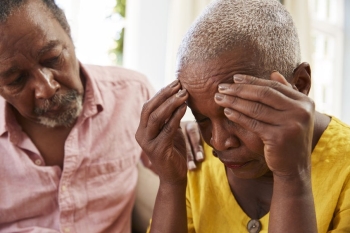
When Does Grieving Become Problematic? Whenever we experience a loss in our life, a grief process begins. Grieving is our psyche’s way of acknowledging a loss and adapting to life without that person, thing, idea, etc. This process is a necessary and healthy way to heal and move on. Grief can often be an intense demanding emotional experience. As a result, the grief process can sometimes become complicated, problematic, and lead to some issues with our mental health. So how do you know when you are having that experience when grief is emotional and unpredictable? How do you know if you are handling it or if it is out of control and handling you?
One of the biggest questions that you need to ask yourself is: Am I effectively handling my basic needs? In the initial days of a loss, it is normal to have eating and sleeping patterns shift, to need a little time off work, to be forgetful, to not be on top of your normal routine etc. However, if you continue to struggle significantly with eating, sleeping, functioning at work or calling out of work, taking care of household needs, isolating, etc., for 2-3 months after the loss, then you are beginning to fall into a problematic, stuck cycle of grieving. Also, when individuals lose a loved one, initially it is a common thought to want to be with that loved one in the afterlife and even to have thoughts of suicide. If these thoughts, persist months later, or if you believe that you may follow through on these thoughts, you need to get help immediately.
Sometimes there may be short periods of time during the grief process when you are non functioning and may need more time off work due to the emotional stress and need support in handling daily living activities (paying bills, cooking, grocery shopping, child care, etc.) During those times it is important to have a good support system in place to help you. When these periods of time turn into significant blocks of time (several months), then you are likely getting stuck.
Another question to ask is: Am I stuck in one phase of grieving? For example, an early reaction to a loss is denying the reality that it happened. If this denial continues for a few months after the loss without any acknowledgment that the loss has occurred (e.g. setting the table for a deceased family member), then you are moving into problematic grief. Another example is sadness or depression that will not lift and begins to become immobilizing is another indication that your grief is problematic.
Am I having any other lingering symptoms? For example, it is normal to feel some anxiety after a loss, but if your anxiety symptoms persist or you begin to have panic attacks regularly, grief has become problematic. Other symptoms of intense anxiety can be regular extreme headaches, nausea/vomiting, extreme muscle tension and pain. So, if you are experiencing these symptoms regularly 2-3 months after the loss and you are not having panic attacks or classic anxiety symptoms, you are likely significantly internalizing your stress and need help.
A final question to ask yourself is: Am I medicating myself with alcohol, drugs, food, or cigarettes? You cannot and should not medicate yourself through grief. If you are finding that you are doing any of these things more than usual, then you are experiencing problematic grief and are potentially working on developing an addiction issue. You have to experience grief in order to work through and resolve it.
If you have answered yes to any of these questions, it’s time to get some help. Going to see a counselor or therapist is a good start and can be very helpful in getting you unstuck and through the grief process effectively. If you are religious, it can also be a good idea to get some guidance from a pastor or rabbi. In addition, your family or friends can be a great source of support. Many people may be there for you initially after a loss, but then often resume their normal lives. Reach out to some family members or friends and let them know that you are having a hard time and need some help. Grief is a difficult process, but you can work through it effectively. Knowing when you need help is part of that process.

























